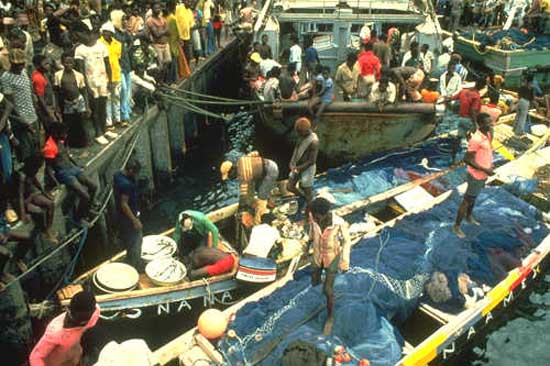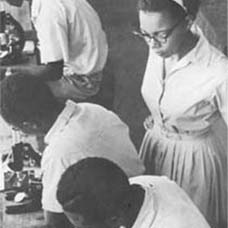
I was eating dinner with some Togolese friends, finishing up a platter of the dish that is a frequent feature of my diet here in West Africa. I actually still like the food after a year working here for the Peace Corps but, contemplating the meal, I think my mind had begun to wander.
AIDS in Africa is no secret, but its orphans are
By Jean-Marc Gorelick
KPALIMÉ, TOGO – Mashed yam with fish sauce. Again. I was eating dinner with some Togolese friends, finishing up a platter of the dish that is a frequent feature of my diet here in West Africa. I actually still like the food after a year working here for the Peace Corps but, contemplating the meal, I think my mind had begun to wander.
Then Valerie, a local schoolteacher, turned to me, and as I recall said: "Jean-Marc, remember the local organization that got money from an international organization for orphans with HIV/AIDS? They asked me to help identify orphans in Kpalimé. Well, I went out to do a count and none of them have HIV or AIDS. There are no AIDS orphans."
I wasn't sure if I heard her correctly at first. I've tried hard not to lose awareness of the pain that surrounds me, but sometimes I can't help protecting myself from the reality of poverty, disease, and death by temporarily tuning out. Or by trying to make some of the horror simply part of my daily routine.
Then I heard her.
"What do you mean none of them has HIV/AIDS?" I was stunned. I've heard stories about people infected with AIDS. I've seen real sickness. I've watched the funeral processions.
"Well," she responded, "we walked around all day, visited house after house, and people there said none of the babies had HIV or AIDS. Even when I asked family members, they told me the same thing. No HIV/AIDS."
I know what you're thinking. How can you say there is no HIV/AIDS? Sub-Saharan Africa is ground zero for the AIDS pandemic.
According to recent UN statistics, just over 10 percent of the world's population lives in the region, but it is home to two-thirds of all people living with HIV.
In Togo, the statistics are similarly bleak. At the end of 2003, the number of children who had lost one or both parents to AIDS was estimated at 77,000. That's a big number for a small country with a population of just over 5 million.
Of course, Valerie and I are all too aware that, despite claims to the contrary, there are AIDS orphans here. We know about the sadness in our large town of Kpalimé.
But the stigma attached to this disease makes it the invisible elephant in the living room that no one talks about. When people die of complications related to the AIDS virus, one is as likely to hear someone chalk it up to voodoo as to a virus. Indeed, despite easy access to two clinics in town, very few people get tested here because of the stigma and, if they do, they rarely share the results.
That is why, despite Togo's high HIV infection rate, Valerie could tell me in all earnestness that she could not find any AIDS orphans.
So we are going to look again. But this time we will be looking for "stigma orphans" - children whose only chance for survival will be parents, grandparents, extended family members, aid workers, and policymakers who are able to cast aside the cruel embarrassment that keeps people from seeking the already limited services that are available.
And the only way this will happen is if those in powerful social institutions - government, churches, schools, and the media - stop the subtle and overt, legal and extralegal, social and economic discrimination that makes secrecy an understandable strategy in an unforgiving world.
• Jean-Marc Gorelick is a Peace Corps volunteer in Togo.







